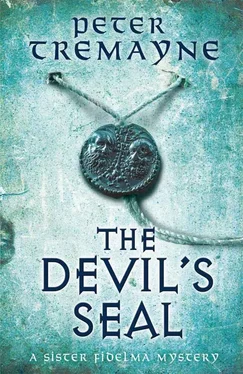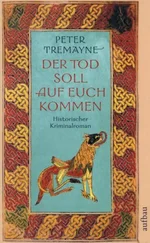Peter Tremayne - The Devil's seal
Здесь есть возможность читать онлайн «Peter Tremayne - The Devil's seal» весь текст электронной книги совершенно бесплатно (целиком полную версию без сокращений). В некоторых случаях можно слушать аудио, скачать через торрент в формате fb2 и присутствует краткое содержание. Год выпуска: 2014, ISBN: 2014, Издательство: Hachette UK, Жанр: Исторический детектив, на английском языке. Описание произведения, (предисловие) а так же отзывы посетителей доступны на портале библиотеки ЛибКат.
- Название:The Devil's seal
- Автор:
- Издательство:Hachette UK
- Жанр:
- Год:2014
- ISBN:9781472208330
- Рейтинг книги:3 / 5. Голосов: 1
-
Избранное:Добавить в избранное
- Отзывы:
-
Ваша оценка:
- 60
- 1
- 2
- 3
- 4
- 5
The Devil's seal: краткое содержание, описание и аннотация
Предлагаем к чтению аннотацию, описание, краткое содержание или предисловие (зависит от того, что написал сам автор книги «The Devil's seal»). Если вы не нашли необходимую информацию о книге — напишите в комментариях, мы постараемся отыскать её.
The Devil's seal — читать онлайн бесплатно полную книгу (весь текст) целиком
Ниже представлен текст книги, разбитый по страницам. Система сохранения места последней прочитанной страницы, позволяет с удобством читать онлайн бесплатно книгу «The Devil's seal», без необходимости каждый раз заново искать на чём Вы остановились. Поставьте закладку, и сможете в любой момент перейти на страницу, на которой закончили чтение.
Интервал:
Закладка:
The conversation would have become stilted had it not been for Eadulf persuading his brother to speak about his previous adventures. Egric had not really wanted to attend the meal, but as it progressed, he grew more relaxed. Indeed, he seemed to dominate the conversation — not that his stories were boring or repetitive. He spoke mainly of his time among the Cruthin, a strange people who dwelled in the north of the island of Britain. It seemed their progenitor was a chieftain called Cruthine, who had seven sons. The Cruthin were a fierce warrior race who painted themselves before going into battle. The Romans had called them ‘the painted people’ — the Pictii .
Oswy of Northumbria had ruled the Cruthin through puppet kings, but Egric explained that when he arrived among them, there was growing resentment between them and the Angles of Northumbria. The Dál Riadans, who had started to settle in the west three centuries earlier, were also growing in strength. It was a year before, when Oswy had died, that the Cruthin rose up.
‘It was a difficult time,’ Egric admitted to his rapt audience. ‘We had been sent to serve Oswy and now even Oswy’s client king, Drust, turned against us.’
‘Sent to serve Oswy?’ intervened Abbot Ségdae with a frown. ‘Surely you were sent among the Cruthin to serve Christ!’
Egric turned and smiled apologetically. ‘You are right. A slip of the tongue. But Oswy was then the legitimate ruler and protector of the Church. The rebels were burning and destroying without distinction.’
‘So how did you escape this carnage?’ Colgú asked.
‘Many of us managed to get to the coast; to a port at the mouth of a river called Deathan. We took a ship back to Streonshalh in Northumbria.’
‘Surely, at such a time, the people you left behind were in need of the Faith?’ Abbot Ségdae remarked. ‘It is against the law that religious be attacked and killed. So this attack was an outrage.’
‘It is difficult to make that argument to a man wielding a sword and shield,’ Egric said sombrely. ‘The company that I was in barely escaped with their lives from the devastating attack of the Cruthín.’
‘Were they not Christian?’ asked Brehon Aillín curiously.
‘They are.’ They were surprised because it was Abbess Líoch who broke her silence. ‘Over two centuries ago a man called Ninnian established his mission to what was then the land of the Cruthin. Many other religious went to that country — even our own Colmcille who took the Faith to the Dál Riada on the seaboard of the Gael.’ She raised her head suddenly and looked at Egric. ‘It is hard to believe that such a people would rise up and attack the holy communities without provocation.’
Egric said indifferently, ‘I can only relay what I saw.’
‘And thankfully, you came safely out of that land,’ Colgú said warmly. ‘And with the even greater support of Providence, you have come safely to Cashel and found your long-lost brother.’
‘Yet at the loss of your companion the Venerable Victricius,’ pointed out Brehon Aillín. ‘And, of course, your two boatmen. Presumably you did not know their names — the names of the boatmen, I mean?’
Eadulf glared at the old Brehon, hearing the derisive note in his voice.
‘I regret that I cannot remember their names,’ he said.
‘And you have no idea of the purpose of your journey?’ Brehon Aillín had asked the question more than once.
Colgú bent forward. ‘Brother Egric has already answered that question. He has stated that he was not taken into the Venerable Victricius’ confidence on that matter.’
Brehon Aillín sniffed as he lowered his head, indicating suspicion on the one hand and acquiescence on the other.
Brother Egric had turned to Abbess Líoch. ‘Mother Abbess, you seem to know something of the Cruthin. Were you ever in their territory? There were a lot of travellers from the Five Kingdoms when I was there, especially from the Kingdom of Ulaidh. The Cruthin spoke a strange mixture of your language and that of their southern neighbours, the Britons.’
Abbess Líoch’s expression was uneasy. ‘Many of us, like my friend Fidelma there, had to travel north to Ulaidh and cross the narrow sea to the seaboard of the Gael where Colmcille set up his abbey on I-Shona. We would then travel through the territories of the Cruthin, as did our countrymen Aidan, Finan, Colmán and Tuda and their companions before us. We went to bring the word of the Faith to the Angles of Northumbria. A Faith rejected by Oswy after his Great Council at Streonshalh.’
Fidelma heard a note of bitterness in Abbess Líoch’s voice and looked nervously at Eadulf.
‘I met Eadulf at that council,’ she reminded her quietly.
‘As we recall, the council ended on amicable terms, and those who wished to maintain the liturgies and rites of the Five Kingdoms did so,’ Eadulf stated. ‘Even Abbess Hilda in the abbey called Witebia did so. So did Cuthbert, Chad and many others. Those who felt they could not live alongside the Roman rites, such as Bishop Colmán, decided to return to this land with those who wanted to do so. There was no discrimination against those who wished to retain their own interpretation of the Faith.’
‘Not while Oswy was alive,’ Abbess Líoch replied curtly. ‘Since I returned from that land, I have heard that the main advocate of the Roman Church at that council has now contrived to make himself Chief Bishop of Northumbria, deposing Chad, who remained sympathetic to our rituals and Faith. I have heard that he and Theodore of Canterbury plan to eliminate all who remain true to the teachings of Colmcille in the kingdoms of the Saxons.’
Colgú intervened with a diplomatic cough. ‘My friends,’ he said, ‘we are here, sharing a meal together. We are not re-enacting some religious council. It is not time for a new subject?’
There was an embarrassed pause, and then Fidelma began to tell the story of how the ancestors of the Eóghanacht had been led to set up their capital and main fortress on the Rock of Cashel. This was for the benefit of Egric. The change of conversation was unnatural but she persevered. There was a general feeling of relief when the chapel bell rang and they moved from the feasting hall to join the small funeral procession gathering in the courtyard.
The body had been washed and wrapped in the traditional racholl or winding sheet. Four members of the religious carried it on a fuat or bier of broom. There were a dozen or so attendants, each carrying flaming brand torches, ready to accompany the body to its last resting place. The apothecary, old Brother Conchobhar, who had laid out the body, was chief among them. Brother Eadulf, having volunteered to conduct the obsequies, took his place at the head of the procession.
Another figure joined them in the darkness, well wrapped and hooded from the chill night air. Abbot Ségdae peered forward in surprise.
‘Brother Madagan? Should you be abroad with your chill?’
‘The wild garlic is soothing,’ the steward replied, suppressing a cough. ‘And I should not be neglecting my duties.’
‘All is arranged and is well,’ the abbot assured him.
Colgú glanced round with a shiver, pulling his cloak more tightly round his shoulders. He bent forward to Fidelma and said softly, ‘When this Bishop Arwald arrives, at least he cannot accuse us of treating his emissary with disrespect.’
‘Is that likely?’ she asked.
‘Better that we find the person who slew him,’ her brother replied. ‘To find the culprit would show a greater respect.’ He raised his voice: ‘Let us proceed.’
Before the cortège could move forward, however, a commanding voice rang out, halting them by its very power.
Читать дальшеИнтервал:
Закладка:
Похожие книги на «The Devil's seal»
Представляем Вашему вниманию похожие книги на «The Devil's seal» списком для выбора. Мы отобрали схожую по названию и смыслу литературу в надежде предоставить читателям больше вариантов отыскать новые, интересные, ещё непрочитанные произведения.
Обсуждение, отзывы о книге «The Devil's seal» и просто собственные мнения читателей. Оставьте ваши комментарии, напишите, что Вы думаете о произведении, его смысле или главных героях. Укажите что конкретно понравилось, а что нет, и почему Вы так считаете.











